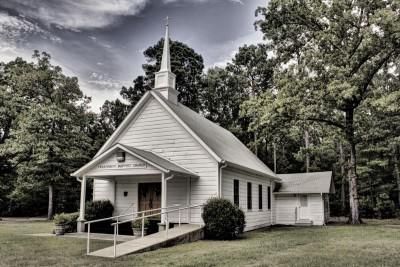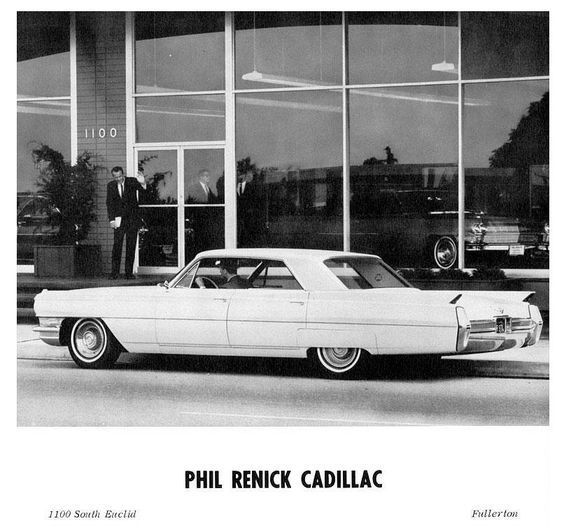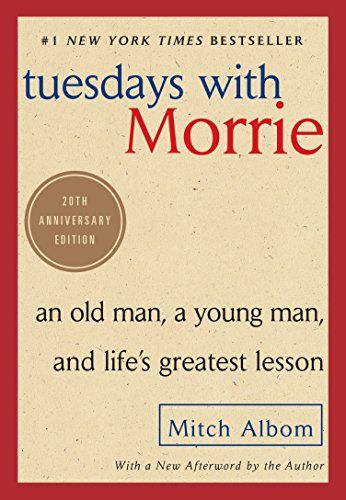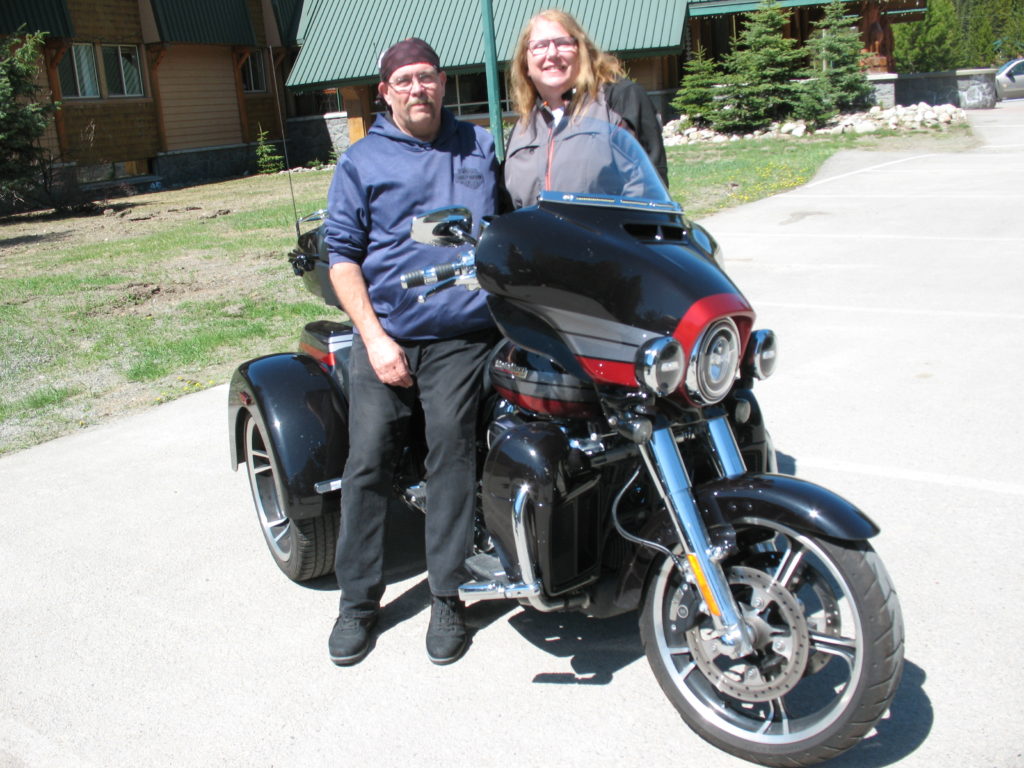
I’ve long been fascinated by the sleek motor bikes that invariably streak by us on Highway #3 at this time of year. Sometimes they come alone. Sometimes in pairs. Occasionally there are half a dozen or more. Their riders remind me of intrepid Cree or Blackfoot warriors in the past, determinedly racing after a herd of buffalo. To me they seem a special breed. A breed that has thrown off many of the constraints that hold most mortals close to earth, where we feel relatively safe. I envy their sense of abandon. If they understand the hazards of their great adventure, they do not reveal it. Their powerful engines roaring, they seem engulfed in a shroud of mystique and charisma.
I recently met one of these fearless ones in the men’s room at Manning Park. His robust appearance and apparel suggested he owned one of the expensive bikes I’d noticed on the lodge’s vast parking area. A big man, I guessed him to be approaching age 50. “It’s a perfect day to be on a bike,” I ventured, wondering if he would deign to speak to a mere car traveller. “Yes,” he responded, “my wife and I are on our way back to New Westminster. It’s always a great day to be on a bike.”
We walked out to his bike together and I met Catherine. They were riding a Harley Davidson trike. “We bought it from the dealership in Chilliwack in December of 2019,” Catherine said. “It was the first one of this model sold in B.C.” It was truly an impressive machine and when Rob suggested I hop aboard, I didn’t hesitate. The comfort was superior to our 2004 Toyota Camry.
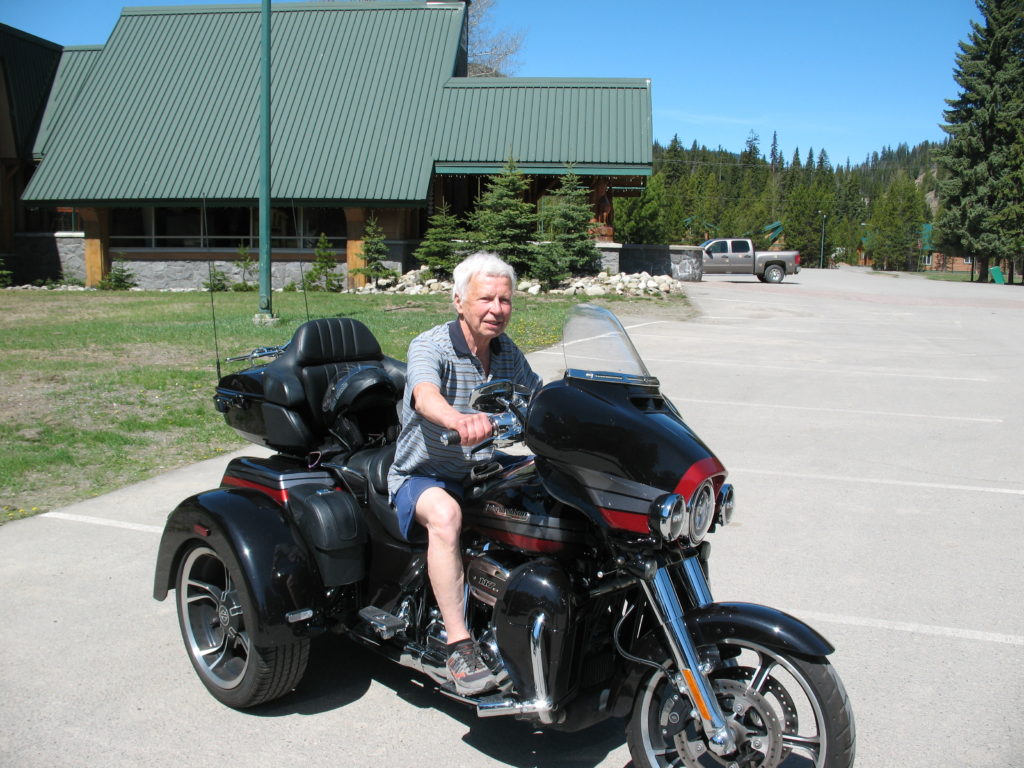
“We traded in our two wheel bike for a trike because Catherine is losing her vision,” Rob explained. “She has only six percent left. She can’t see when a corner is coming so she doesn’t know when to lean. The three wheels make it much more stable and leaning isn’t an issue.”
“The passenger seat is raised,” Catherine said. “This gives me a better view. It also means I swallow more bugs.” She didn’t seem to consider this a high price for a comfortable ride and a great view. “We’ve travelled with it a lot,” Catherine continued. “We rode it to Vegas to get married. We actually ran away to escape the hoopla.” They both appeared to be in their forties, somewhat beyond the usual age for eloping, but certainly fitting for two individuals looking for a life of adventure.
I’ve talked with trike riders at Manning Lodge in the past. A couple of years ago two men well past age 60 stopped there for a coffee break. Their gleaming bikes were nearly new, a Harley and a Bombardier. According to a sales person in the Chilliwack dealership, trikes are ideal for seniors who want to continue riding. Because of their much greater stability, they’re a good option for someone with compromised hips or knees. Being larger, they are more visible in traffic. Also, the third wheel and additional weight makes them more difficult to tip. These and other features provide an increased sense of safety.
For anyone wanting all the bells and whistles, and there are many, the price tag on a trike can be intimidating. Rob and Catherine wanted it all and apparently were able to pay the $60,000. Their bike tells them if a tire is low or if they need to add petrol. It warms the seats and hand grips. It also permits Catherine to adjust the foot rests up or down, plus much more.
My friend Terry mentioned to me recently he plans to ride as much as possible this summer. “I’m in my late sixties and I still feel strong,” he said. “My bike is 600 pounds though and that’s a lot of weight to pick up if it goes down.” He acquired the bike in New Brunswick some years ago and rode it to Hedley, BC. I’m sure he’d be grateful for a trike if he needed to do that again.
For seniors who still retain a dream of cruising the highways on a motorcycle, have a strong body and a robust bank account, a trike seems a good fit. Just because we’re past our “best before date,” doesn’t mean we can no longer enjoy adventures. We just need to search for other options.

